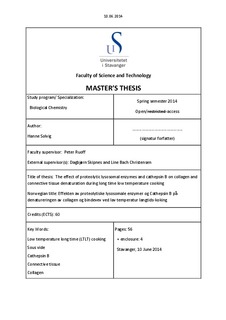The effect of proteolytic lysosomal enzymes and cathepsin B on collagen and connective tissue denaturation during long time low temperature cooking
Master thesis
Permanent lenke
http://hdl.handle.net/11250/224241Utgivelsesdato
2014-06-10Metadata
Vis full innførselSamlinger
Sammendrag
Low temperature long time (LTLT) cooking it has been seen to improve the palatability of meat by improving tenderness and juiciness as well as retaining a relatively pink colour in the meat. An important contributing factor in in tenderness is quality and amount of collagen rich connective tissue.
Collagen in connective tissue is thought to first denature and solubilized at temperatures above 70⁰C. However earlier studies have found the improved tenderness between 50⁰C and 65⁰C to be a result of decreasing tensile strength in connective tissue. LTLT uses temperatures as low as 50⁰C it is possible that proteolytic enzymes are active, which can potentially break down the insoluble part of collagen allowing for continued thermal denaturation of the rest of the protein.
The aim of this study was to investigate the effect LTLT cooking on proteolytic denaturation of connective tissue. To investigate the effect of LTLT on proteolytic activity, the study specifically considered cathepsin B activity of both the enzymatic mixture found in purified lysosomal extract and in pure cathepsin B from bovine spleen. The study used 55⁰C, 60⁰C and 65⁰C and time intervals from 1 to 72 hours. To look at enzymatic effect as well as enzyme activity, the study observed the difference between thermal and enzymatic denaturation of isolated connective tissue and pure collagen with increasing time and temperature.
Cathepsin B activity reduced rapidly with increasing time and temperature for both purified lysosomal extract and the pure cathepsin B. Temperature was observed to have less influence on enzymatic activity than time.
Collagen and connective tissue denatured more when incubated together with enzyme compared to heat alone. Lysosomal extract resulted in the most distinguishable change in tissue texture for both substrates, though collagen was more denatured than connective tissue.
The study therefore concluded that though enzyme activity reduced quickly at temperatures between 50⁰C and 65⁰C, proteolytic activity still had some influence on thermal denaturation of collagen during LTLT cooking.
Beskrivelse
Master's thesis in Biological chemistry

